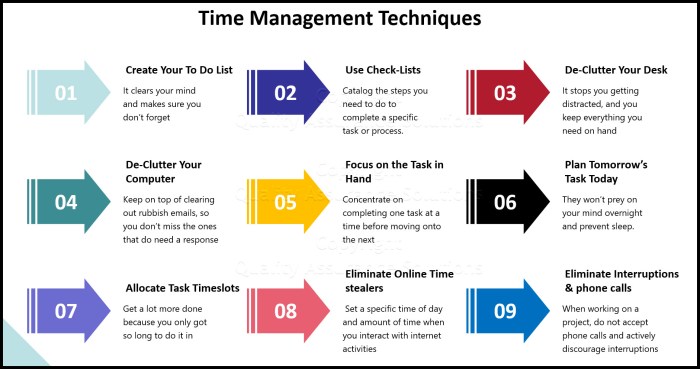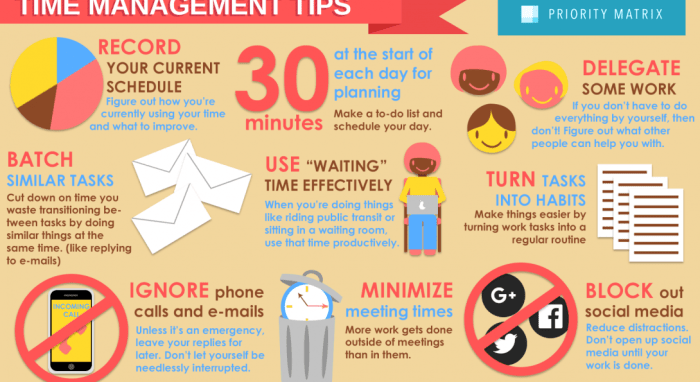Time Management Tips are essential for juggling school, work, and social life like a pro. From prioritizing tasks to avoiding procrastination, this guide will help you stay on top of your game.
Time Management Techniques

In the fast-paced world we live in, effective time management is crucial for success. By utilizing various techniques, individuals can optimize their productivity and achieve their goals efficiently.
Pomodoro Technique
The Pomodoro Technique is a popular time management method that involves breaking work into intervals, typically 25 minutes long, separated by short breaks. This technique helps maintain focus and avoid burnout by providing structured work periods followed by brief rest periods. By utilizing this method, individuals can enhance their concentration and productivity throughout the day.
Setting Priorities
One key aspect of effective time management is setting priorities. By identifying tasks that are most important and need immediate attention, individuals can allocate their time and resources effectively. Prioritizing tasks ensures that essential activities are completed first, leading to a more organized and productive day.
Planning and Scheduling: Time Management Tips

Effective planning and scheduling are crucial for better time management. By organizing your day efficiently, you can maximize productivity and reduce stress.
Utilize Digital Tools for Scheduling Tasks
Using digital tools like calendars and apps can streamline your scheduling process. These tools offer reminders, notifications, and the ability to sync across devices, ensuring you never miss an important task or appointment.
Create To-Do Lists for Time Management
To-do lists are a simple yet powerful tool for managing your time effectively. By listing out tasks and prioritizing them, you can focus on what needs to be done and avoid wasting time on less important activities.
Set Aside Time for Planning Each Day
Make it a habit to set aside a few minutes at the beginning or end of each day to plan out your schedule. This allows you to anticipate any potential challenges or conflicts and adjust your plan accordingly.
Break Down Tasks into Manageable Chunks
When planning your day, break down larger tasks into smaller, more manageable chunks. This not only makes the tasks seem less daunting but also allows you to allocate time more effectively.
Review and Adjust Your Schedule Regularly
Regularly review your schedule to see if you are staying on track with your tasks and goals. Be flexible and willing to adjust your schedule as needed to accommodate unexpected events or changes.
Avoid Overloading Your Schedule
While planning your day, avoid overloading your schedule with too many tasks. Be realistic about what you can accomplish in a day and prioritize tasks based on their importance and deadline.
Avoiding Procrastination
Procrastination is a common challenge that many people face when trying to manage their time effectively. It can lead to missed deadlines, increased stress, and decreased productivity. By identifying the reasons for procrastination and implementing strategies to overcome them, you can improve your time management skills and achieve greater success in your tasks.
Identifying Common Reasons for Procrastination, Time Management Tips
- Feeling overwhelmed by the task at hand
- Fear of failure or perfectionism
- Lack of motivation or interest in the task
- Poor time management skills
One of the most effective ways to overcome procrastination is to break down tasks into smaller, more manageable steps.
Techniques to Stay Focused and Avoid Distractions
- Set specific, achievable goals for each task
- Eliminate distractions, such as turning off notifications or finding a quiet workspace
- Use time-blocking techniques to allocate specific time slots for different tasks
- Practice mindfulness and stay present in the moment
Impact of Procrastination on Time Management and Productivity
- Procrastination can lead to rushed work and lower quality outcomes
- It can cause unnecessary stress and anxiety
- Procrastination can create a cycle of delayed tasks and missed deadlines
- It hinders overall time management efficiency and productivity
Delegation and Outsourcing
Delegation and outsourcing are key strategies in effective time management, allowing individuals to focus on high-priority tasks and maximize productivity.
Importance of Delegation
- Delegating tasks to others helps distribute work evenly, ensuring that no one person is overwhelmed with responsibilities.
- It allows individuals to leverage the skills and expertise of team members, leading to better results and outcomes.
- Delegation promotes teamwork and collaboration, fostering a positive work environment.
- By assigning tasks to others, individuals can free up their time to focus on more strategic or critical aspects of their work.
Tips for Effective Delegation
- Clearly communicate expectations and deadlines when assigning tasks to team members.
- Match tasks to the skills and abilities of team members to ensure successful completion.
- Provide necessary resources and support to help team members accomplish their delegated tasks.
- Regularly check in with team members to monitor progress and offer guidance if needed.
Benefits of Outsourcing
- Outsourcing certain tasks can save time and allow individuals to focus on core business activities.
- It can provide access to specialized skills and expertise that may not be available in-house.
- Outsourcing can lead to cost savings, as external providers may offer services at a lower price point.
- By outsourcing non-essential tasks, individuals and organizations can increase efficiency and streamline operations.